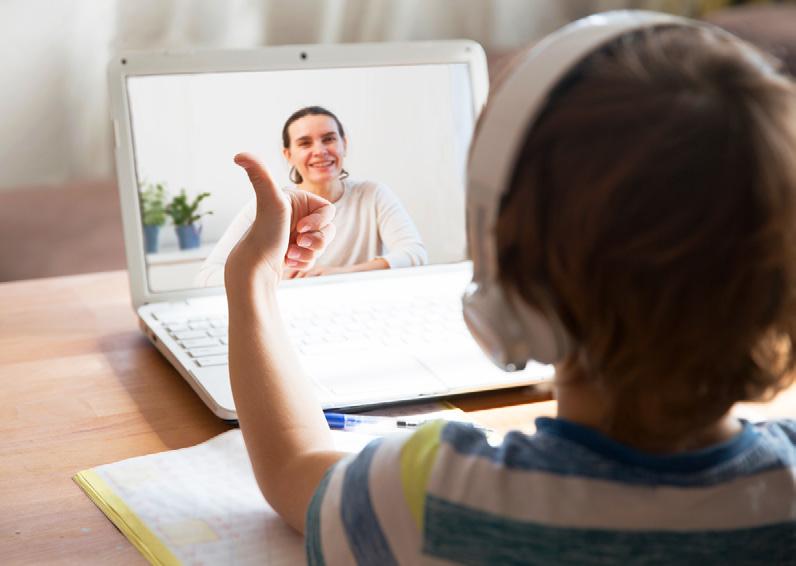
6 minute read
THE COVID STORM — AND SILVER LININGS FOR CHILDREN WITH SPECIAL EDUCATIONAL NEEDS. Fatema Yusuf Jangberwala shares the
The COVID Storm
— and Silver Linings for Children with Special Educational Needs
Advertisement
What was the impact of COVID 19 on children with Special Educational Needs? Fatema Yusuf Jangbarwala investigates
AHong Kong based study conducted by Yusuf Jangbarwala, a master’s student at Hong Kong University, during the COVID fifth-wave school closures demonstrated that whilst there were severe challenges, there were also benefits for Children with Special Educational Needs (children with SEN) in the early years. These possible silver linings are less reported in academic literature but can be of particular interest for parents and educators as we move towards recovery from pandemic-induced setbacks.
The Storm
The critical developmental age in the early years for children with SEN coupled with the unique learning challenges make them more vulnerable to the pandemic-induced restrictions – school closures, mask-wearing, social distancing measures, playground closures. Results of the study verify that young children require face-to-face teaching offering hands-on and playful experiences for optimal development. Online learning fulfilled the ‘need of the hour’ during school closures. Keeping children with SEN engaged was challenging on virtual platforms with general distractibility and shorter attention spans. Assessing children’s body language and emotions to provide adequate needs-based support, as done in a physical classroom environment, proved problematic.
Many social difficulties can only be overcome by practicing social skills with peers in schools, supported by the expertise of teaching staff. COVID restrictions severely limited opportunities to practice social targets.
When children with SEN returned to schools during the intermittent resumptions, social problems were found to be more pronounced, evidenced by a drastic increase in playground disputes. This was coupled with rise in anxiety levels of children with SEN themselves for a return to school that was somewhat unfamiliar and out of routine.
Despite returning to school, social and emotional needs were further hampered due to mask-wearing. The findings highlight that prolonged mask wearing impacted children’s ability to read facial expressions and emotions. Long-term mask-wearing has also raised questions on speech and language developmental impacts. Whilst the precise impact of wearing a mask on language development is unclear, it is clear that social and emotional regulation is affected. This creates a catch-22 situation; despite the children being at school, they are still not able to function optimally due to the lingering social distancing measures continued to be implemented in Hong Kong schools. Additionally, it has hampered young children from building strong immunity with faces covered, lacking exposure to the outside world.
Longer term this poses challenges towards ‘Early intervention’ (EI), where children are provided specialised support at the youngest possible age. The COVID restrictions have created a ‘hot oven’ for developmental delays and deficiencies in early learning skills (fine/gross motor and school readiness skills). The questions that arise for parents and educators is whether the children’s difficulties are due to developmental or neurological causes, or simply a product of lack of inperson schooling and mask-wearing? This results in delaying EI for children with milder needs as they may go undiagnosed as ‘COVID-related’.
The Silver Linings
Shifting focus to ‘looking for the good’, the study revealed that some children with autism spectrum disorder (ASD) and with social difficulties actually thrived during online learning. Home environment provided a ‘karma space’. Familiarity and comfort of home resulted in less sensory overload (sensitivity to light, noises, distractions) compared to the classroom environment resulting in improved attention. It also provided autonomy over free time to pursue creative home-play (LEGO, arts etc) without the pressures of school time-tables and structured extra-curricular classes. children with SEN had autonomy to deal with their emotions when they were challenged by simply switching off their camera without the pressure of being watched in a classroom setting.
The nature of online learning was comforting for some children with ASD, shy children and those who are selectively mute, as it encouraged them to ‘come out of their shell’. Technology provided various ‘alternate means of expression’; making videos, drawing, typing, using voice-to-text and typing – rather than being limited to faceto-face classroom conversations. Conversely for children with Attention Deficit Hyperactivity Disorder (ADHD), online learning was not beneficial as they were unable to sit still in front of the screen and lacked access to classroom learning tools.
Online learning also provided parents an opportunity to learn more about their children’s schoolin, enabling them to understand the unique needs of their children compared to peers (being unable to sit still on ZOOM for 20 mins). Such realisations are a first step for parents to seek EI for their children and work with educators and SEN professionals to provide their children with the appropriate support and care post-pandemic.

The study also found ‘reduced bullying’ as a short-term benefit of online learning, as highlighted in other studies. However, when inperson schooling resumed, the prior socialisation deprivation resulted in increased bullying instances in the playground and classroom.
Looking ahead
Hong Kong has undergone COVID restrictions for more prolonged periods compared to other developed countries. The time has come for society, government policy, health departments, schools, educators and parents to divert resources and focus towards this vulnerable group of children to restore their holistic development. The Society for Community Organization (2022) estimates that there are 82,858 children with SEN in Hong Kong, which is 8.09 per cent of all children. This number could be higher with the number of children suspected of SEN and not yet identified. Developmental delays in social, emotional, cognitive and physical skills from the COVID restrictions may result in an increase in the percentage of SEN children. It is important for parents and educators to identify early warning signs in children and seek professional help as soon as possible so they are not left behind. As we look to play ‘catch up’ for almost three years since the onset of the pandemic, it is important to meet the children where they are and move them along. children with SEN need consistent routines and structure which is only achievable by reverting to pre-COVID norms sooner than later by resuming full day schooling, relaxing maskwearing and other health protocols in schools. With in-person schooling resumed from the start of this academic year, it is also important to retain the benefits attained during COVID for children with SEN with the use of pandemic-evolved technology and less stringent schedules. Educators are in strong agreement that adaptations in curriculum were required to offer more opportunities in school for play, practicing social skills, emotional regulation, problem-solving, group work and sharing ideas. By focusing first on these basic skills, we will ensure children with SEN are equipped with the essential tools required for optimal social and academic learning.
This article shares the findings from a Research study conducted by the author as a Master’s project at HKU. A special thank you to the 21 participants who have contributed to the findings.









